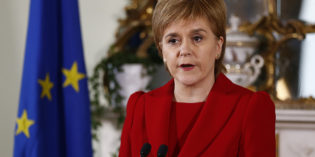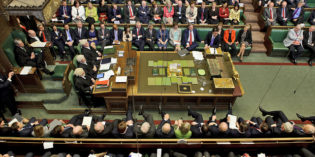Author Archive: Democratic Audit UK

Book Review: The Creative Citizen Unbound: How Social Media and DIY Culture Contribute to Democracy, Communities and the Creative Economy edited by Ian Hargreaves and John Hartley
Drawing upon the findings of a 30-month research project, The Creative Citizen Unbound: How Social Media and DIY Culture Contribute to Democracy, Communities and the Creative Economy, edited by Ian Hargreaves and John Hartley, explores the potential of civic-minded individuals to participate in ‘creative citizenship’ by utilising social media and engaging with the creative economy. Although […]

The Brexit shambles: Charting a path through the rubble
In a paper published this week by Nuffield College, Oxford Jim Gallagher argues that in responding to June’s Brexit vote the UK and Scottish governments must proceed rationally, on the basis of the evidence, and pursue the national interest. They should not feel bound by the Leave campaign’s promises and should seek to stay in, […]

This May be Tory feminism: The second woman PM is not Margaret Thatcher Mark II
As the second Conservative Prime Minister, it is hardly surprising that Theresa May is being compared to Margaret Thatcher. But Julie Gottlieb writes tracing the political ancestry on the basis of their common gender is misleading. In particular, she highlights May does not share Thatcher’s apparent rancour for feminism, and argues that we could be on the […]

Should we just leave the selection of the party leader to MPs?
From 1922-1980, Labour leaders were elected by MPs in a secret ballot. While there are superficially attractive reasons for the increased trend towards democratising party leadership elections, Richard Johnson questions whether it has really given us better value and proposes that we should reconsider the merits of leaving party leadership selection to Labour MPs. More […]

The internal democracy dilemma: Balancing MP and member preferences in leadership selection
The resignations and leadership challenges in the wake of the Brexit vote have reignited debates around intra-party democracy. Tom Quinn offers an overview of the selection processes in the four main UK-wide parties and outlines both the challenge and importance of balancing MP and membership approval. Similar PostsHow democratic are the UK’s political parties and party […]

Disappointed? That’s a sign you’re doing democracy
There has been surge in party membership in the weeks following Brexit and Will Brett welcomes the renewed engagement as a possible first step towards rebuilding the consent required for a functioning representative democracy. However, he warns that party politics requires patience and a willingness to compromise, and makes a plea to new members not […]

Brexit and Northern Ireland: key issues and possible consequences
In this post Alan Whysall sets out the key issues for Northern Ireland in the upcoming Brexit negotiations and examines the likely consequences. He suggests that, if things do not go well, there is a risk of the unwinding of political and social progress. It is urgent that the options for Northern Ireland are quickly […]

The use of EU Citizens as bargaining chips may be in violation of European human rights law
Leaving the EU will not exempt the UK from its responsibilities under the European Convention on Human Rights. Virginia Mantouvalou illustrates how the refusal of Theresa May and others to guarantee the rights of EU citizens following the vote in favour of Brexit could be in violation of European law, and writes that although the new Prime […]

Book Review: Strangers at our Door by Zygmunt Bauman
In this new short book, Strangers at our Door, Zygmunt Bauman examines the origins, contours and impact of the present-day moral panic around the ‘migration crisis’ in Europe. He explores the fear generated by political campaigns, arguing that this ‘crisis of humanity’ instead requires a ‘fusion of horizons’ through dialogue. While Nicolas Schneider suggests that a more systematic […]




 Democratic Audit's core funding is provided by the Joseph Rowntree Charitable Trust. Additional funding is provided by the London School of Economics.
Democratic Audit's core funding is provided by the Joseph Rowntree Charitable Trust. Additional funding is provided by the London School of Economics.